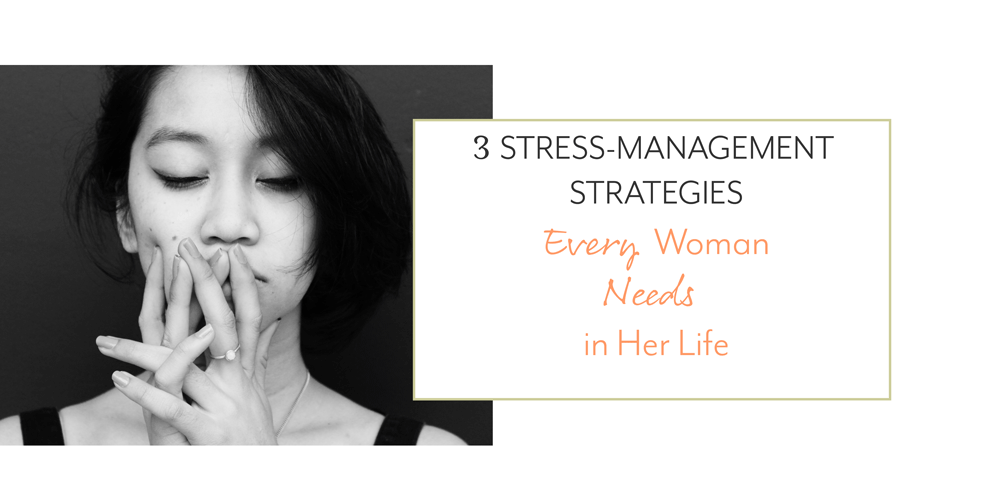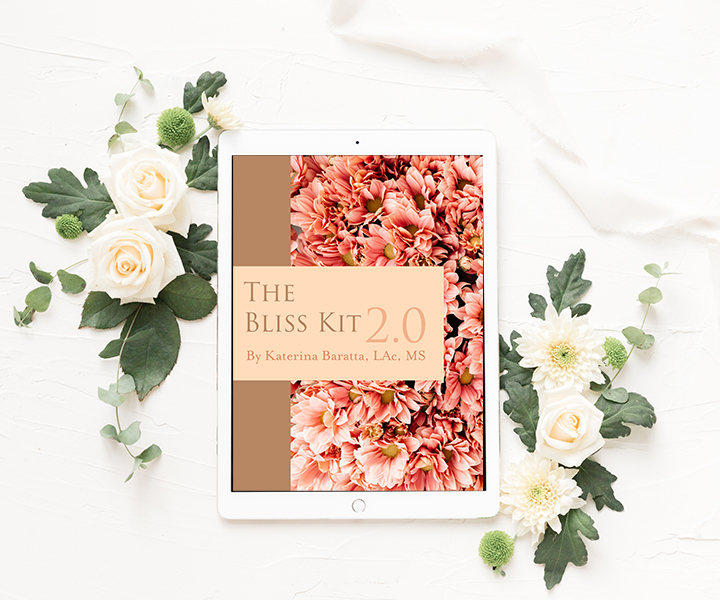An endless supply of dirty dishes.
A to-do list that never gets completely checked off.
Feeling like you never have enough energy or time to do all the things you want to do.
Sound familiar?
These are the realities of life for most modern women.
They’re also a huge source of stress.
Especially when your Instagram feed is littered with images of ecstatic smiling people in immaculate homes and exotic locations, and meanwhile you’re just proud when you manage to cook a balanced meal, let alone a pretty one.
Chronic stress is a big problem for many women.
Because not only does stress make you feel lousy emotionally, it can also have a huge negative impact on your physical body and health overall.
I won’t add to your worries by listing all of the diseases that are caused by stress.
But suffice it to say, the list is long and the prospects aren’t good, which means you want to nip it in the bud whenever you can.
And simply put, stress is exhausting.
Everything feels heavier and more burdensome when you’re dealing with chronic stress.
So whether your goal is to be healthy, happy, or you just want to feel a little more sane, stress-management should be one of your top priorities.
Because you can’t pour from an empty cup, and a lot of people are counting on you to fill theirs.
Here are 3 Stress-Management Strategies Every Woman Needs in Her Life
1. Bedtime Routine
You already know that kids thrive on routine, but so do you!
Even if you have kids and get woken up 5 times in the night, sticking to a routine around sleep will help to regulate your hormones.
So you’ll feel more awake when you’re awake and get more rest out of the little sleep you do manage to get.
So be strict with yourself.
Choose a bedtime and wake time that gives you 8-9 uninterrupted hours (or 10-11 interrupted hours) of sleep, and stick to it.
Then create a bed-time routine for yourself.
Here are some things you might include:
• Turn off all electronics an hour before bed
• Write in your journal
• Meditate, either on your own or listen to a guided meditation
• Do some yoga
• Practice breathing exercises
• Read something inspirational or comforting
• Pray
• Mindfully drink a cup of herbal tea
• Smell some lavender
• Give yourself a face massage
Or whatever else floats your boat!
Your bedtime routine can be 2 minutes or an hour, whatever you can realistically fit in consistently.
The key is just to do the same relaxing sequence everyday so your body starts to get triggered to get sleepy when you do your routine.
2. Take Supportive Herbs
Herbs have been used as medicine for all of human history, and they’re just as effective today as they were back then.
Some herbs, like ashwagandha, rodiola, and reishi, are adaptogenic, which means that they can actually help your body process stress more efficiently.
After taking a small dose of these herbs over a few weeks you end up handling stressful situations with a lot more grace.
Unless you’re working with a trained herbalist, I generally recommend starting with 5 drops of one herb in tincture form, 3x/day for 3 weeks to see if they help.
Other herbs like lavender, passionflower, and chamomile are gentler and are great at soothing you in the moment and helping you feel more relaxed.
These herbs are great to sip as teas throughout the day and in the evening, or you can take them as a tincture as well.
But remember that even though herbs are all natural, they can still be strong medicine and some come with risks.
I recommend consulting a trained herbalist and/or your healthcare provider before starting any new herbal regimen.
(And if that’s something you want, I have more than a decade of experience with medicinal herbs. So if you’re interested in getting a personalized herbal prescription you can contact me here to set up a free consultation.)
3. Eat Without (Too Much) Distraction
Eating is a great opportunity to get out of your head and into your body.
I know it can seem nearly impossible when you’ve got screaming toddlers, talkative spouses, and 19,845 other distractions calling for your attention, but taking the time to eat mindfully can do wonders for your stress level (and waistline!)
The trick is to focus on your food.
First off, don’t eat when you’re driving, looking at your phone, or distracted in any other controllable way.
Then when you’re eating, take a second to just notice how your food looks.
Check out the colors and textures that are in front of you, and notice how your body responds.
Then take note of the way it smells, and the way it feels as you cut into it or hold it in your hands.
What’s the sensation as you chew?
Where do the flavors hit your tongue?
How does it feel as it enters your stomach?
Even if you just have time to do this with your first bite, and even if everyone is trying to get your attention at the same time, close your eyes and give yourself those 20 seconds to indulge in the sensations of your food.
When you do you’ll start to turn off your stress-hormones and turn on your digestion.
This will help draw your blood out of your muscles and into your core, causing your body secrete more digestive fluids and helping you absorb more nutrients.
This will also boost your metabolism, helping both your waistline and energy level in the long run.
And you’ll get a little boost of some feel-good hormones, so you’ll handle the chaos around you with more ease.
There are hundreds of helpful stress-management strategies out there, and you have to experiment to find the ones that work for you.
But start with these three and you might be blown away at what a huge difference small intentional actions can make on your life.
Now I’d love to hear from you.
What stress-management techniques do you love?
Leave a comment, because your idea might just change another mama’s life!

Download my (FREE) Step-By-Step Guide to Intuitive Eating and learn 5 fail-proof strategies to:
• Lose weight without dieting
• Stop stress eating and obsessing over food
• And finally feel good in your body so you can get on with your life
Enter your name + email now for instant access.





